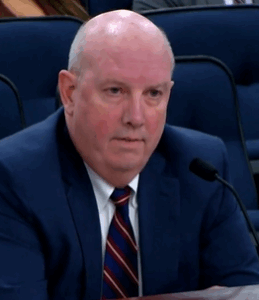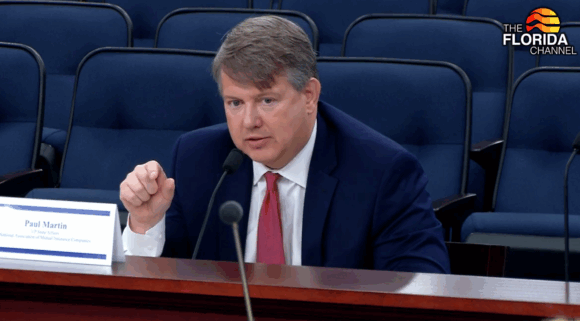Despite the rapid rise of artificial intelligence in the insurance sector, along with claims of widespread errors and even discrimination by algorithms, A.I. is becoming vital to the industry – but insureds will be protected by existing statutes, insurance advocates told Florida lawmakers Tuesday.
“If a practice is prohibited for a human to do on behalf of an insurance company, it is prohibited for A.I. to do,” said Paul Martin, vice president of state affairs for the National Association of Mutual Insurance Companies. “Artificial intelligence is not an end run for insurance companies around a state’s statutes or its regulations.”
Martin was one of three property-casualty insurance officials who were asked to testify before the Florida House Subcommittee on Insurance and Banking ahead of the 2026 legislative session. He and others at the meeting said that insurers have been using A.I. in one form or another for more than 30 years, and the tool is steadily improving efficiency in claims handling, accuracy in underwriting and pricing, and in marketing products to consumers – all of which can help hold down premiums.

“With an increasing number of retirees eligible for an increasingly expensive entitlement programs, the standard of living in the United States will plummet without tools like A.I. that can leverage the decreasing percentage of workers and help preserve companies’ institutional knowledge,” said Gary Sullivan, director of emerging risks for the American Property & Casualty Insurance Association.
Three bills that would have put limits on the use of A.I. in claims handling – and would have required human review – failed to pass the Florida Legislature in the spring 2025 session. But similar measures are expected to be introduced again for the upcoming session.
State Rep. Hillary Cassel, a policyholder attorney who sponsored one of those bills this spring, said that litigation across the country has targeted health insurers’ use of artificial intelligence in claims denials. She asked the witnesses to explain what current Florida law bars claims denials based solely on the use of A.I.
Thomas Koval, with FCCI Insurance Group and the Florida Insurance Council, did not directly answer Cassel’s question. Martin noted that any actions by insurers, even decisions aided by A.I., are governed by Florida’s extensive insurance statutes and regulations.
“Who is responsible if there is a mistake in the claims handling process?” Martin asked, rhetorically. “The insurance company is always responsible, and we think that is the consistent piece here.”
Other industry advocates have pointed out that property insurance practices and Florida regulations already outpace those for health insurance companies on transparency in claims denials. Many denials or payment demands by health insurers list no adjuster names or responsible party names, said Lisa Miller, former deputy insurance commissioner for Florida, who produced a copy of a hospital payment demand.
In October 2024, though, then-Florida Chief Financial Officer Jimmy Patronis issued an emergency rule – later made permanent – that bars property insurers from revising field adjuster reports without an explanation to insureds. The revised reports must also include the desk adjuster’s name.
The Tuesday House committee meeting can be seen here, on the Florida Channel. The 2026 Florida legislative session begins Jan. 13, and committee meetings are scheduled until then.
Top photo: Paul Martin of NAMIC, speaking at the hearing. (Florida Channel)
Was this article valuable?
Here are more articles you may enjoy.



 What Analysts Are Saying About the 2026 P/C Insurance Market
What Analysts Are Saying About the 2026 P/C Insurance Market  Fingerprints, Background Checks for Florida Insurance Execs, Directors, Stockholders?
Fingerprints, Background Checks for Florida Insurance Execs, Directors, Stockholders?  Florida’s Commercial Clearinghouse Bill Stirring Up Concerns for Brokers, Regulators
Florida’s Commercial Clearinghouse Bill Stirring Up Concerns for Brokers, Regulators  Insurance Issue Leaves Some Players Off World Baseball Classic Rosters
Insurance Issue Leaves Some Players Off World Baseball Classic Rosters 


